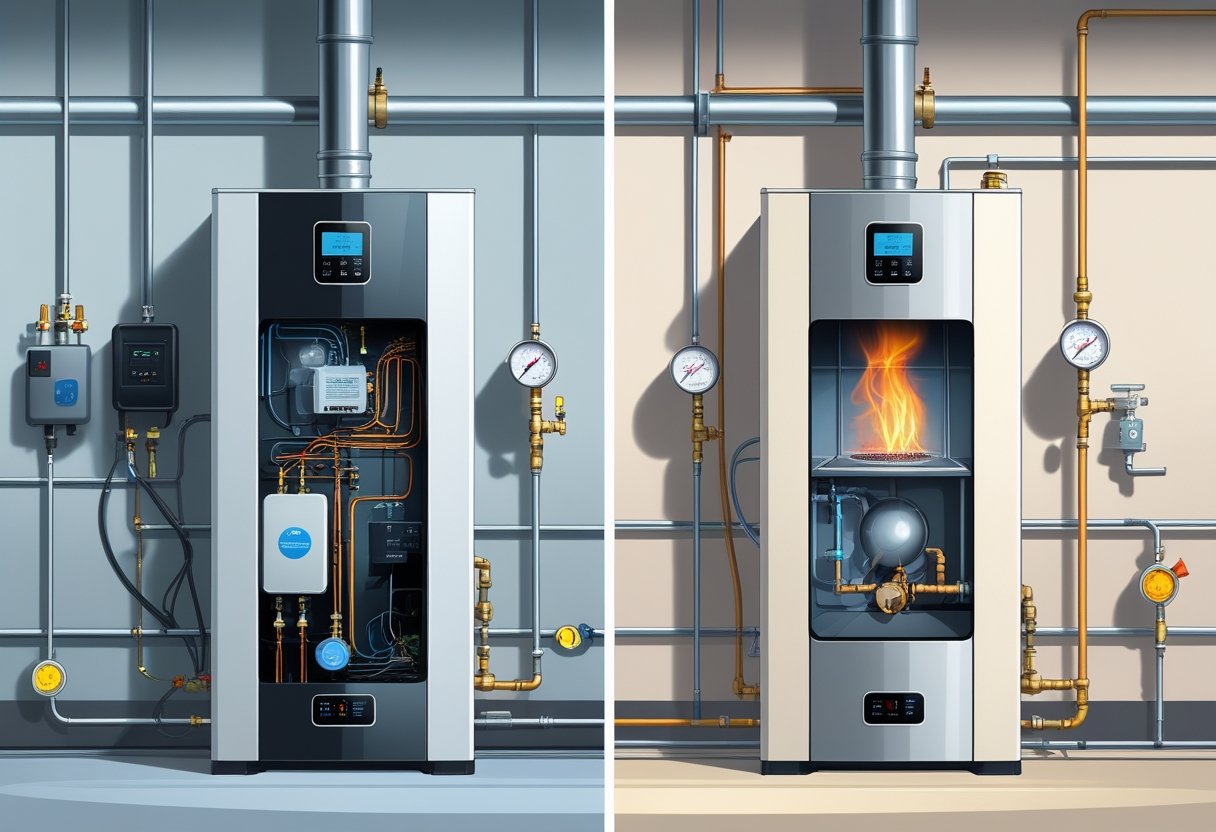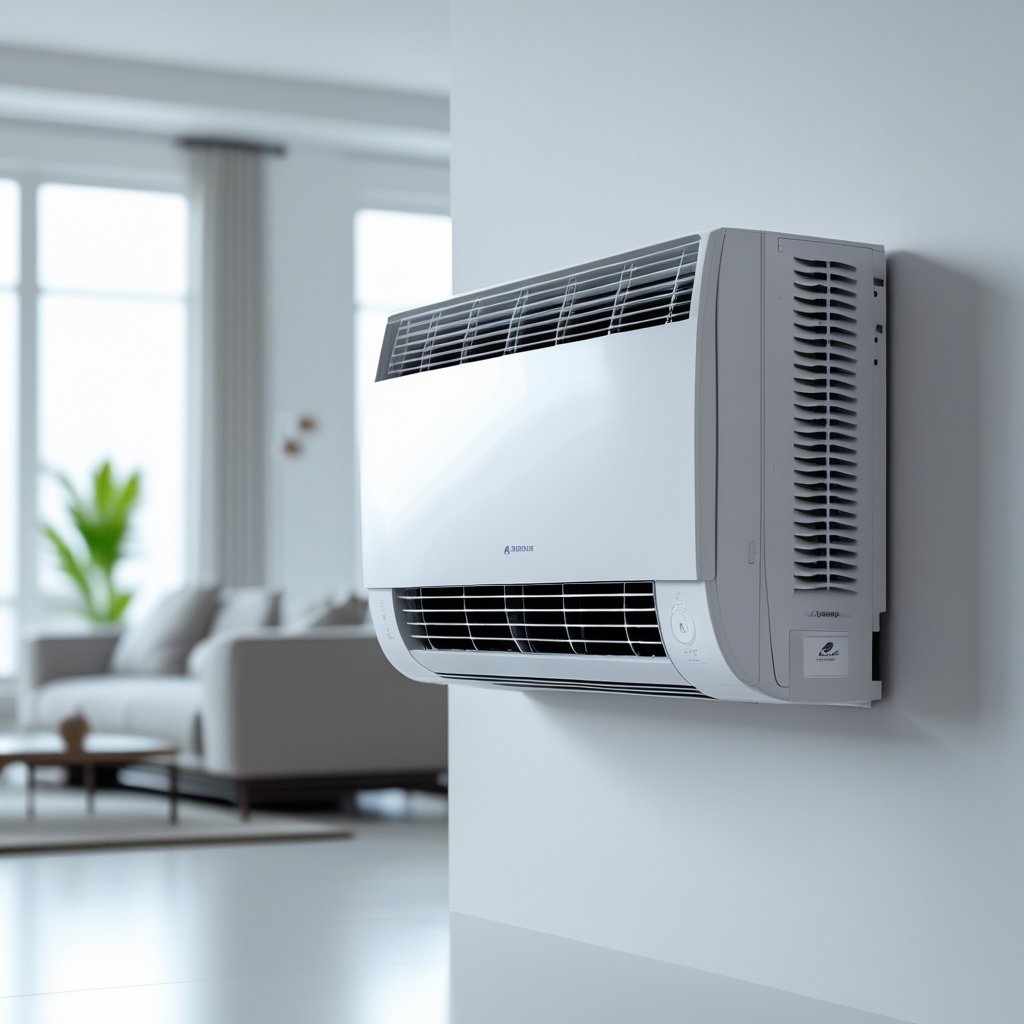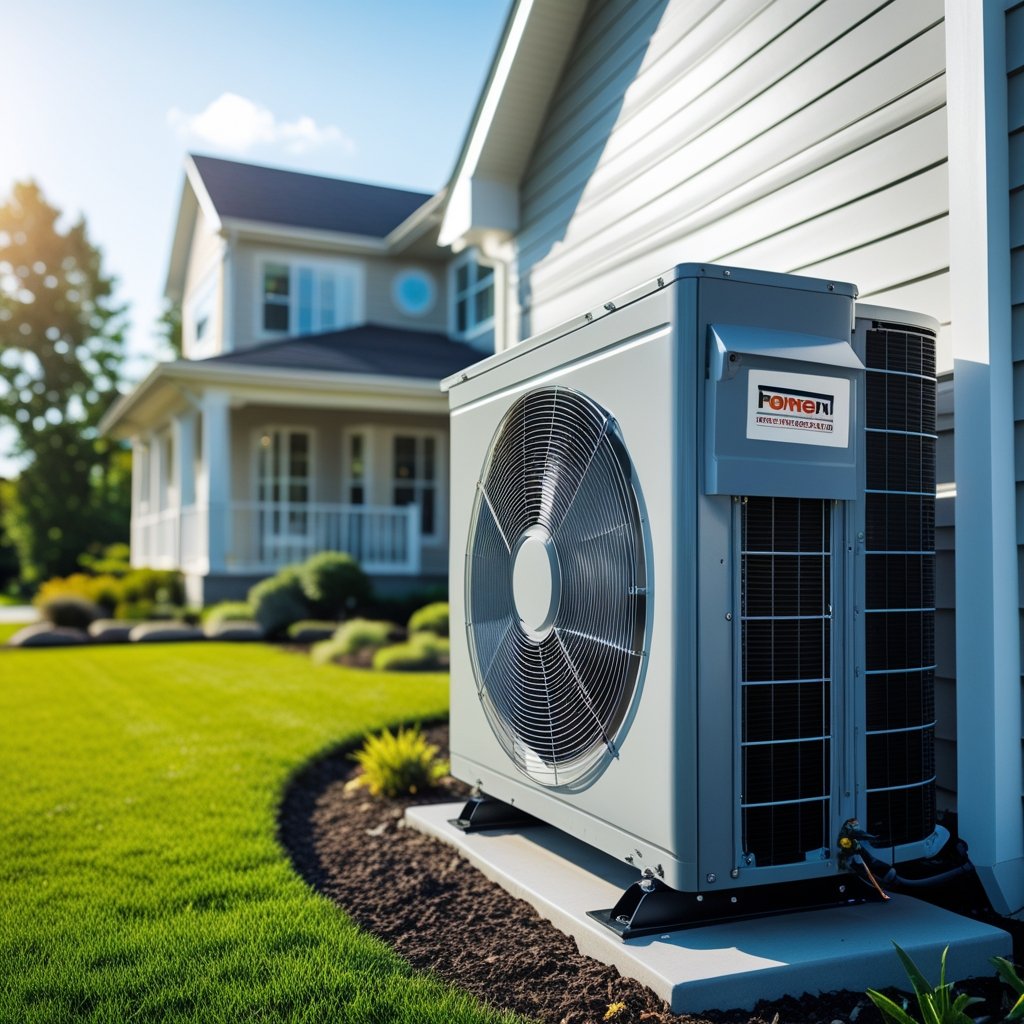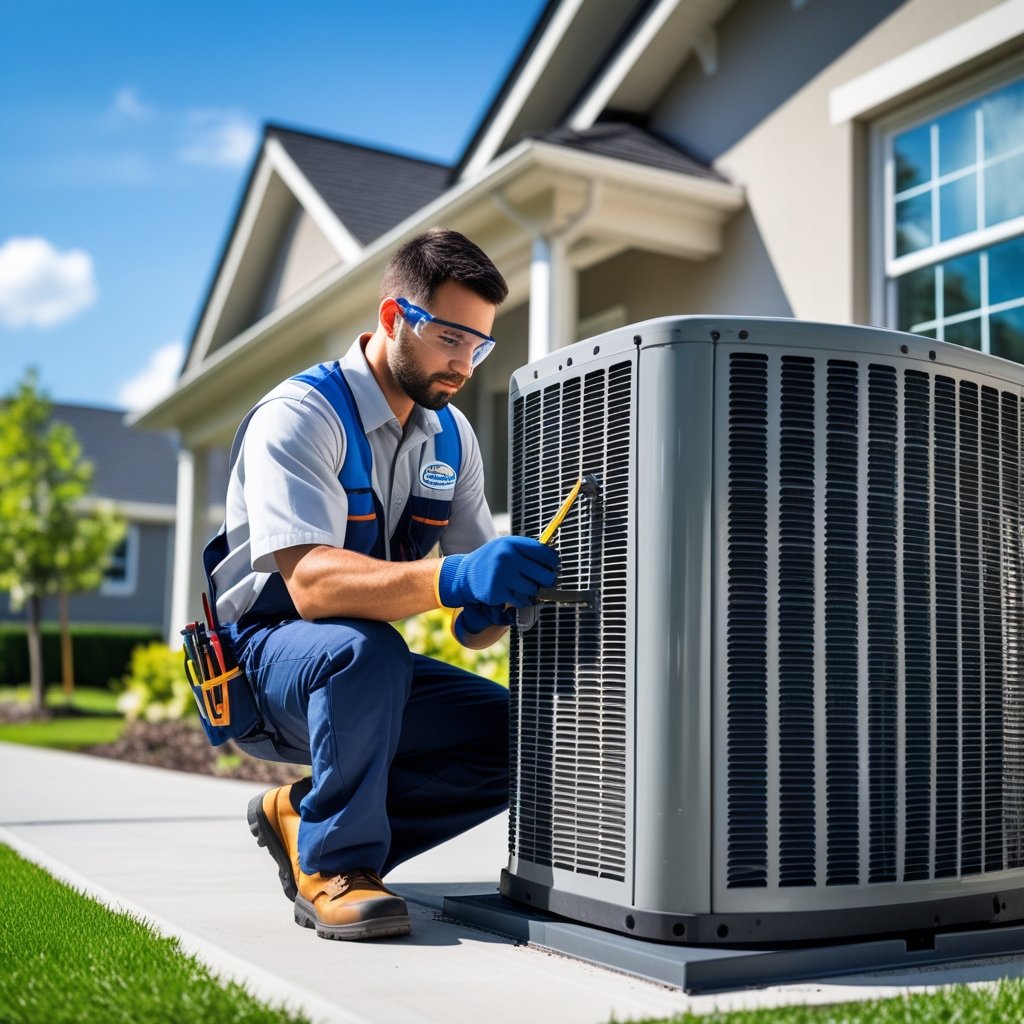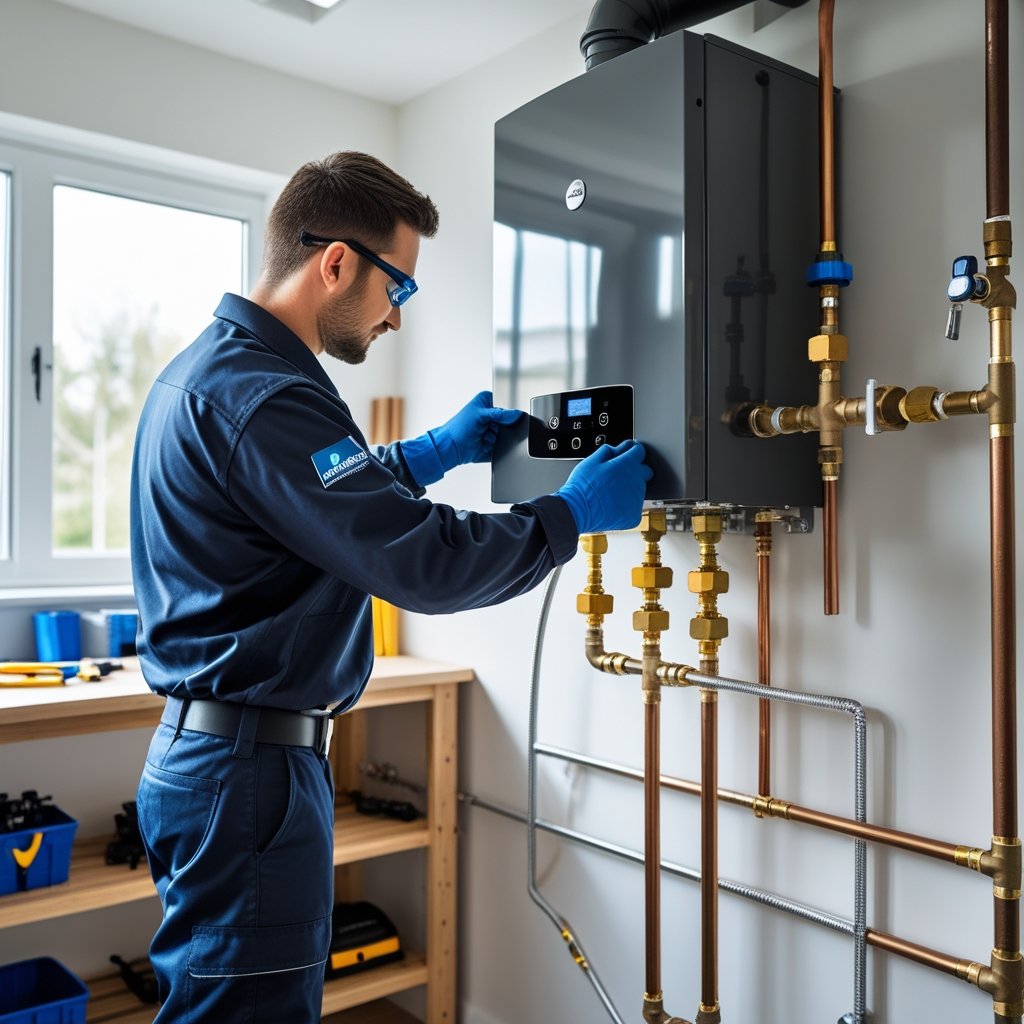When you’re picking out a boiler for your home, you’ll want to know what kind of fuel it uses. Boilers are either gas-powered or electric, with gas boilers showing up in most homes these days. Gas boilers burn natural gas or propane to heat water, while electric boilers just plug in and use electricity. Both options have their perks, depending on what you want for energy and how your home’s set up.
If you’re in South Central Pennsylvania, companies like Leo Kob Co. have been around for ages, helping folks choose and install the right boiler. Maybe you’re after the cost savings of a gas boiler, or maybe you’d rather go with the cleaner, low-hassle electric kind. Either way, knowing your options makes it a lot easier to pick what’ll fit your needs and budget.
Boiler fuel types are just the start. You’ll want to think about installation, upkeep, and efficiency—especially if you care about saving money or making your system last.
Understanding Boilers
Boilers heat your home by making hot water or steam. They run on different energy sources and use pretty simple steps to move heat around your space. If you get how boilers work, you’re already ahead in choosing the right one.
What Is a Boiler
A boiler heats water to give you warmth or hot water at home. Usually, it uses gas, electricity, or oil as fuel. Once it gets the water hot, it either sends it through pipes to radiators or turns it into steam for heating rooms.
You’ll see boilers in all shapes and sizes—some mount on the wall, others sit on the floor. They’re popular in cold places and can handle heating for one room or a whole building. When you call Leo Kob Co., they’ll help you pick a boiler that matches your home’s size and whatever fuel you prefer.
How Boilers Work
Boilers heat water by burning fuel or using electric elements inside a sealed tank or heat exchanger. When the water’s hot enough, it travels through pipes to radiators or sends steam through vents.
A thermostat tells the boiler when to kick on or off, keeping your home comfy without wasting energy. Some have pumps to move water faster. You’ll want to keep up with maintenance to make sure your boiler runs safely and doesn’t quit on you when you need it most.
In South Central Pennsylvania, Leo Kob Co. offers service plans with yearly boiler checks to help your system last and work efficiently.
Types of Boilers
Boilers come in different types, mainly based on how they heat your place. Some use electricity, others run on gas. The right one for you depends on your home’s setup, energy prices, and what you actually want.
Electric Boilers
Electric boilers heat water with electricity. They’re clean, quiet, and don’t make local emissions since there’s no burning involved. If you want something low-maintenance and easy to squeeze into small spaces, these are worth a look.
No need for gas lines or venting, which is a relief for a lot of people. The downside? If electricity’s pricey where you live, running one can get expensive. Still, they deliver steady heat and pair nicely with renewable energy setups.
Thinking about an electric boiler in South Central Pennsylvania? Leo Kob Co. can handle the install and make sure it fits your needs.
Gas Boilers
Gas boilers burn natural gas to heat water, then send that heat through pipes or radiators. They’re usually cheaper to run than electric because natural gas often costs less.
You’ll need proper venting to let combustion gases escape safely. Installation’s a bit more involved and should really be done by pros. Gas boilers put out strong, reliable heat—no surprise they’re common in places like Harrisburg and Lancaster.
Leo Kob Co. has the know-how to install and repair gas boilers, so you get solid, safe heat that lasts.
Electric Boilers vs. Gas Boilers
Boilers split into two main camps: electric and gas. Each one brings its own quirks—cost, energy use, installation, you name it. Knowing the basics helps you zero in on what’s right for your place.
Key Differences
Electric boilers use electricity to heat water or steam—no burning fuel, so no emissions in your home. Gas boilers burn natural gas or propane, which does release carbon dioxide and other stuff you don’t want to breathe.
Electric boilers tend to be smaller, quieter, and easier to install—no need for venting or gas lines. Gas boilers usually need more space and a pro to set up the fuel safely.
Electric boilers are popular where there’s no natural gas or if indoor air quality’s a big deal. Gas boilers are everywhere because natural gas is often cheaper than electricity.
Energy Efficiency Comparison
Electric boilers hit nearly 100% efficiency on paper—they turn almost all the electricity into heat. But, if your power comes from coal or oil, the big-picture efficiency drops.
Gas boilers usually run at 80% to 95% efficiency. The newer condensing models can squeeze out up to 95% by grabbing extra heat from exhaust gases.
Electric boilers don’t lose energy through venting, so their onsite efficiency looks great. But when you factor in your energy bill and carbon footprint, it really depends on where your electricity comes from and what it costs.
Cost Differences
Electric boilers are usually cheaper up front and quicker to install. At Leo Kob Co., electric water heater installs start at about $1,600—tankless systems run higher. Maintenance is lower since there’s not much that can go wrong.
Gas boilers cost more to buy and put in because you need gas lines and venting. But gas is often cheaper than electricity, so you might save money over time. Maintenance and safety checks do add to the long-term cost, though.
If you’re in South Central Pennsylvania, check if you can get natural gas and compare local electric rates before deciding. Always go with licensed pros for installation to dodge surprise expenses down the line.
Advantages of Electric Boilers
Electric boilers have some upsides that might make them a smart pick for your place. They’re safer and cleaner than gas boilers, and if you care about the environment, they’re worth a look.
Safety Benefits
No fuel burning means no gas leaks or carbon monoxide worries. That’s a big deal for safety—especially if you’ve got kids or pets running around.
Since they run on electricity, electric boilers don’t need chimneys or venting. That’s less maintenance and no risk of dangerous gases sneaking into your home.
You won’t have to mess with fuel storage or the smell of gas. No open flames, no tanks—just a little more peace of mind.
Environmental Impact
Electric boilers don’t make direct emissions, unlike gas boilers that burn natural gas. So, no carbon monoxide or nitrogen oxides floating around your house.
If your power comes from renewables like wind or solar, your boiler’s carbon footprint can be tiny. That’s a plus if you’re looking to shrink your home’s impact on the planet.
Leo Kob Co. can help you find rebates or tax credits for going electric, so you might even save some cash while doing your part for the environment.
Advantages of Gas Boilers
Gas boilers are still a go-to for a lot of homeowners. They’re strong, reliable, and easy to keep fueled up—especially in bigger homes or places with easy gas access.
Performance in Large Homes
Got a big house? Gas boilers can keep every room warm without breaking a sweat. They pack more punch than most electric models, so you stay cozy even when it’s freezing out.
Gas boilers heat water fast and keep the pressure steady. That means hot showers and radiators that actually work, with no long waits.
Leo Kob Co. installs a lot of gas boilers around South Central Pennsylvania because they handle big spaces well. Keep up with maintenance and you’ll get years of solid performance.
Fuel Availability
Natural gas is everywhere in South Central Pennsylvania—Lancaster, York, Harrisburg, you name it. No need to worry about running out or refilling tanks like with oil or propane.
The gas comes right through underground pipes, so you skip delivery hassles and storage worries. That makes gas boilers pretty convenient and low maintenance.
Plus, some local utilities offer rebates or credits for switching to efficient gas systems. That can help with up-front costs and lower your bills.
Choosing the Right Boiler for Your Home
The right boiler for you depends on your local weather, how much space you have, and what you’re willing to spend over time. Keeping these things in mind helps you find what fits your home heating needs.
Climate Considerations
If your winters are long and brutal, gas boilers usually come out on top. They heat water fast and keep up when demand spikes. Electric boilers might lag behind in super cold places and can get pricey to run.
In milder spots, electric boilers can work just fine. They’re quieter and simpler to install. And if your electricity is clean, running an electric boiler is better for the environment.
Installation Requirements
Gas boilers need a gas line, venting, and more room for equipment. That can mean a longer, more expensive install—especially if you don’t already have a gas hookup.
Electric boilers are easier. Just a power source and you’re set. They take up less space and don’t need venting, which is handy for smaller homes or spots where gas isn’t practical.
If you call Leo Kob Co., they’ll check out your setup and give you honest advice on what’ll work best.
Running Costs
Gas boilers usually mean lower fuel bills, especially in South Central Pennsylvania where natural gas is pretty affordable. So, month to month, you might save more with gas.
Electric boilers cost more to run because electricity is pricier. But, they need less maintenance—no burner, no chimney. That can save you on repairs and headaches.
Here’s a quick look:
Boiler TypeFuel CostMaintenance CostLongevityGas BoilerLowerModerate15-20 yearsElectric BoilerHigherLower10-15 years
Balancing these costs with your home’s needs is the trick. Leo Kob Co. can walk you through the options and keep things fair and straightforward.
Maintenance and Longevity
Keeping your boiler in shape means it’ll run safely and last longer. Regular maintenance checks catch little problems before they turn into big, expensive ones.
For both gas and electric boilers, you’ll want to get the parts cleaned, pressure checked, and safety controls tested. If your system starts making weird noises or the heat gets patchy, don’t wait—call a pro.
A few basics to keep your boiler happy:
- Book annual inspections
- Flush the system to clear out buildup
- Swap filters if needed
- Keep an eye on efficiency and fuel use
Leo Kob Co. has solid maintenance plans to help you get the most from your boiler. Their techs in South Central Pennsylvania focus on honest work—no surprises.
A well-kept boiler can even qualify you for energy rebates, cutting down costs. Plus, regular care means your system lasts longer, so you’re not replacing it every few years. It’s a bit of work, but it pays off when your home stays warm all year.
Future Trends in Boiler Technology
Boiler technology keeps shifting, mostly to help you cut energy use and, hopefully, shrink your bills. Looking ahead, expect more efficient models that lean on cleaner energy sources.
A major shift? Electric boilers powered by renewables. These cut down on pollution and work well with solar or wind setups. I wouldn’t be surprised to see more homes in South Central PA trying them out soon.
Hybrid systems are catching on, too. They mix gas and electric boilers, aiming for a sweet spot between cost and efficiency. Plus, you get a backup when energy prices decide to spike or dip.
Smart controls are getting more advanced. You can tweak your boiler from your phone, and the system adjusts itself to your schedule. That means less wasted energy—without sacrificing comfort.
So, what’s probably coming up next?
- More electric and hybrid boilers
- Higher energy efficiency ratings
- Smarter tech built right in
- More rebates and incentives for eco-friendly options
At Leo Kob Co., we see how these changes matter for local homes. We help folks in places like Harrisburg and Lancaster find systems that actually save them money over time.
And honestly, keeping your boiler maintained is just as important as any new tech. Give Leo Kob Co. a call to talk about maintenance plans—protect your investment and keep things humming along.
Frequently Asked Questions
Picking between a gas or electric boiler? It really comes down to how they work, what they cost, and what fits your place best.
How do I determine if my boiler operates on gas or electricity?
Check your boiler’s label or manual to find the energy source. You can also spot a gas line or, for electric, just a power cord.
Still not sure? One of our Leo Kob Co. techs can figure it out fast during a service visit.
What are the running costs associated with electric versus gas boilers?
Electric boilers usually cost more to run, since electricity tends to be pricier than natural gas. Gas boilers often have lower fuel costs, but you might need to think about chimney upkeep.
Your actual costs depend on how much you use your system, local rates, and how efficient your boiler is.
Can you calculate the monthly cost of operating an electric boiler?
Sure. Take your boiler’s wattage, multiply by the hours you use it daily, then by your electricity rate per kWh. Divide by 1000 for kilowatt-hours.
For example, a 10 kW boiler running 4 hours a day at $0.12 per kWh costs about $4.80 a day, so roughly $144 a month.
Is an electric boiler or a gas boiler more efficient and cost-effective?
Electric boilers turn almost all their electricity into heat—so, nearly 100% efficient. Gas boilers usually hit about 85-95%.
Still, gas boilers often win out on cost in the long run, just because gas is cheaper than electricity in most places.
What advancements have been made in electric boiler technology recently?
Lately, electric boilers have gotten better electronic controls and run more quietly. Some come with smart thermostats and can link up with home automation.
They’re also smaller now, which makes them easier to tuck into tight spaces.
What are the main differences between an electric combi boiler and a heat pump?
An electric combi boiler heats water right as you need it, using electricity—no waiting around, just hot water on demand. A heat pump, on the other hand, pulls warmth from the air outside and brings it into your home and water system, so it ends up using less electricity in the long run.
Heat pumps usually cost more upfront and might need a bit more space to set up, but they’re definitely more energy-efficient.

